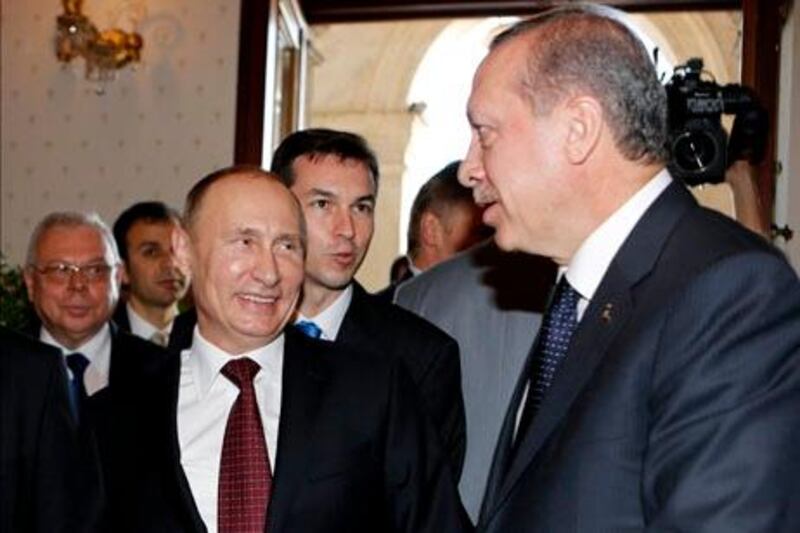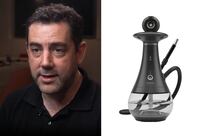ISTANBUL // Russia criticised Turkey yesterday for requesting Nato missile defence systems to be deployed along the border with Syria, calling it an "additional provocation".
Turkey wants the Patriot missiles to protect its 900-kilometre border with Syria but Russia opposes such a move.
Shortly before the Russian president, Vladimir Putin, and the Turkish premier, Recep Tayyip Erdogan, held talks about the crisis in Syria, Turkey scrambled fighter jets to its southern frontier after Syrian warplanes bombed rebel positions near the border.
The countries failed to overcome differences over Syria but they did vow to work on "new ideas" to solve the Syrian crisis.
While Russia understands Turkey's concerns about possible violence at the border, bringing in a missile system was not the right way to react, Mr Putin said.
"It is wrong to create a situation for additional provocations," the Russian leader said. "Syria is not in a position to launch an attack," he added.
Mr Erdogan, who called Mr Putin a "dear friend", said both Turkey and Russia wanted the bloodshed in Syria to end. He said the countries' foreign ministers would intensify their efforts to find a solution.
Mr Erdogan and Mr Putin met one day before an expected decision by Nato to send Patriot missile defence batteries to the border between Turkey and Syria.
"New ideas have come to the table during our talks, and we will work on those together," Mr Putin said without giving details.
"But there are differences in the method of how to get there."
He insisted that Moscow's support for Damascus should not be confused with support for the Bashar Al Assad regime.
"We are not protecting the Syrian government, we are not its advocate," he said.
Despite Turkish hopes for a softening of the Russian position on Syria, high-level discussions in Istanbul produced no such change, though Mr Putin stressed that the two countries' positions on Syria were similar in principle.
After more than three hours of talks with Mr Erdogan Mr Putin said that they could not agree how to end the conflict in Syria that has killed more than 40,000 people since an uprising against Mr Al Assad began in March last year.
Shortly before Mr Putin's arrival in Istanbul yesterday, tensions flared at the Turkish border following a Syrian air raid close to the frontier and a subsequent sortie of Turkish F-16 fighter planes. One person was reported dead and 20 injured.
A Turkish diplomat said that Turkey sent fighter jets to the border area in response to Syrian jets bombing rebel positions close to the Turkish border town of Ceylanpinar.
The Syrian jets attacked rebel positions in Ras Al Ayn, a Syrian town on the border, with Ceylanpinar on the other side of the fence.
Turkey's state television reported that Turkish ambulances crossed into Syria to pick up wounded after the raid.
A high-ranking general of the rebel Free Syrian Army (FSA), Malik Kurdi, warned Turkey yesterday that missile attacks from Syria were possible.
"The regime has its back to the wall," the general, the deputy commander of the FSA, told the Turkish news channel NTV. "There could be an attack at any time."
At a meeting in Brussels today, Nato is expected to formally accept a Turkish request for Patriot batteries that could be used to fend of missile attacks from Syria. The three batteries, two from Germany and one from the Netherlands, could be deployed in the coming weeks.
A Turkish official confirmed that there had been little movement in the Russian position. "They repeated what they have been saying," the official said.
But he added that he did not think that bilateral ties would be damaged because of the differences. Dmitry Peskov, Mr Putin's spokesman, agreed. "Our differences of opinion do not influence the essence of our bilateral relations," he said.
In a further sign that both countries are determined to look beyond the Syrian crisis, 11 agreements were signed during Mr Putin's visit, mainly on intensifying economic and cultural relations.
Both Mr Putin and Mr Erdogan said their countries aimed to increase bilateral trade from about US$35 billion (Dh128.5bn) at the moment to $100bn in the forth coming years.
* With additional reporting by Reuters and the Associated Press





